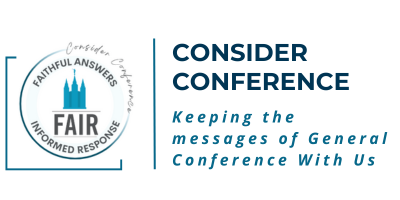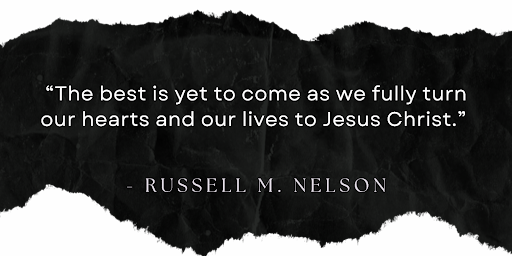
Are we truly ready for the Savior’s return? President Russell M. Nelson’s recent General Conference talk, The Lord Jesus Christ Will Come Again, challenges us to examine our discipleship and deepen our spiritual preparation. As the world grows more complex and faith questions arise, President Nelson offers guidance for navigating today’s uncertainties with hope and dedication. His focus on temple worship, gathering Israel, and the powerful role of the Atonement speaks directly to those who may wonder, How do we hold fast to our faith in a turbulent world?
Questions, Misconceptions, and Criticisms
- Does the Lord speak to us today?
- Response: Latter-day Saints believe in continuing revelation, as emphasized in Amos 3:7: “Surely the Lord God will do nothing, but he revealeth his secret unto his servants the prophets.” General Conference provides an avenue for receiving the Lord’s guidance tailored to the challenges of our day.
- Within the Church: Even for those who accept modern revelation, the tendency to cherry-pick which counsel to follow, or to forget prophetic teachings soon after hearing them, can be a challenge.
What is a “litmus test”?
In its original scientific context, a litmus test is a method for determining whether a substance is acidic or basic by using litmus paper, which changes color based on the substance’s properties. Over time, the term has come to mean any definitive test or standard used to evaluate the truth, authenticity, or reliability of something.
In a spiritual context, President Nelson suggests using the messages of General Conference as a litmus test to discern truth. By studying prophetic counsel, comparing it with scripture, and seeking confirmation through the Spirit, we can evaluate whether our choices, beliefs, or understanding align with God’s will.
How can we use conference messages as “a litmus test” of truth?
President Nelson’s counsel to study conference messages invites us to use them as spiritual tools to discern truth and make decisions in alignment with God’s will. Consider this three-step strategy for incorporating conference messages into your life:
- Study and Reflect: Dedicate time each week to study a specific talk from the most recent conference. Look for recurring themes and personal applications. Tools like the Gospel Library app can help you create and organize notes for easy reference.
- Pray for Guidance: Seek confirmation of the principles taught in conference through prayer. As you do so, the Spirit can help you understand how to apply these teachings in your unique circumstances.
- Act on What You Learn: Choose one principle from each talk to implement in your life. For example, if a talk emphasizes temple worship, schedule your next temple visit and set goals to make attendance a regular part of your life.
-
- Logical Fallacy to Watch For:
Critics often employ the fallacy of appeal to tradition when dismissing modern revelation, suggesting that only ancient scripture is valid because it has stood the test of time. This perspective disregards the pattern of God’s interactions with His children, which consistently include guidance through living prophets.
- Logical Fallacy to Watch For:

Defending Divine Doctrines
President Nelson teaches that regular temple attendance enables members to come closer to Christ and receive guidance for daily challenges. Through temple worship, members receive “protection from the buffetings of the world.”
- How Temple Covenants Strengthen Faith: Each visit to the temple reinforces covenants that enable members to draw on divine power. This is particularly relevant for individuals experiencing a faith crisis, as it emphasizes personal spiritual empowerment and divine support.
- How Temple Attendance Empowers Those in Faith Crisis: For individuals in a faith crisis, the temple can serve as both a refuge and a source of strength. It provides a sacred environment to step away from worldly distractions and seek clarity through reflection and prayer. The covenants made in the temple offer a reminder of God’s enduring promises, helping to anchor faith amid uncertainty. Even if immediate answers to doubts are elusive, the peace and reassurance found in the temple can help individuals reconnect with spiritual truths and the divine.
Temple teachings emphasize eternal perspectives, such as the Atonement of Jesus Christ and the Plan of Salvation, reframing personal struggles within a broader, hopeful context. By attending with intent—whether to ask heartfelt questions, focus on symbols, or simply feel God’s love—those in a faith crisis can experience moments of renewal and guidance, demonstrating faith in God’s ability to lead them through challenges.
Jesus Christ Will Come Again
President Nelson boldly testified that Jesus Christ will literally return to reign on the earth, fulfilling ancient prophecies and ushering in His millennial kingdom. This doctrine not only distinguishes Latter-day Saint beliefs but also serves as a call to action for all who follow Him. The temple plays a central role in this preparation, as it helps individuals focus on Christ, make sacred covenants, and draw on His strengthening power. For those in a faith crisis, the temple offers a refuge to reflect on these eternal truths, providing peace and clarity that can help reframe doubts within the context of Christ’s promised return.
As President Nelson emphasized, the Lord’s return is imminent, and preparing for it should be our highest priority. The temple’s teachings and ordinances remind us of the Savior’s central role in God’s plan and invite us to align our lives with His teachings. Attending the temple with intent—whether to seek answers, connect with Christ, or renew spiritual strength—can help individuals feel empowered to face their struggles with hope and conviction. In this sacred space, we can better understand the Savior’s invitation to “come unto [Him]” and prepare to meet Him when He comes again.
Application
To prepare for the Savior’s return, consider making temple worship a regular part of your life. Start by setting a goal to attend the temple at least once a month, focusing on one specific way you can draw closer to Christ during each visit. For example, you might study scriptures related to His Second Coming beforehand, then reflect on how temple covenants help you prepare spiritually for that day.
Additionally, make the Savior’s return a central focus of your personal worship. During daily scripture study or prayer, ask, “What can I do today to be ready to meet the Lord?” Write down impressions and act on them, whether it’s improving a relationship, serving someone in need, or deepening your understanding of His gospel. These small, consistent efforts can help you live in readiness for the fulfillment of prophecy while experiencing greater peace and purpose in the present.
Historical and Doctrinal Connections
Contextual Background
President Nelson’s teaching on the Second Coming resonates with Moroni’s final chapter, Moroni 10, which encourages seeking Jesus Christ and preparing for His return. President Nelson’s assurance that “the best is yet to come” aligns with Moroni’s hope-filled invitation: “Come unto Christ, and be perfected in him” (Moroni 10:32).
Resources for Deeper Understanding
To understand the Church’s teachings on the Second Coming and temple worship more fully, readers can explore resources like:

Living Apologetics
Practical Application: Living a Life of Purpose
President Nelson emphasizes that our decisions to follow Christ bring clarity, direction, and strength. Here are some ideas for applying his counsel practically:
- Engage in Temple Worship: Commit to attending the temple regularly to deepen your understanding of covenants and strengthen your faith.
- Share the Teachings of Christ: Look for ways to testify of the Savior. Personal conversations, small study groups, and family discussions can open paths for others to feel peace through Christ.
Faith in Action
President Nelson says that “It is neither too early nor too late for you to become a devout disciple of Jesus Christ.” Decide today to take action and become a devout disciple of Christ.
Suggested Actions
- Reflect on your discipleship: President Nelson suggests we “make [our] discipleship [our] highest priority.” Begin by dedicating time each day for scripture study and prayer focused on Christ’s life and teachings.
- Study Moroni 10: This week’s Come, Follow Me lesson invites us to seek spiritual gifts and prepare for Christ’s return. Reflect on these verses and identify one way you can apply them in your life.
- Participate in Family History and Temple Work: By engaging in temple work, we help fulfill the mission of gathering Israel, bringing unity to both sides of the veil.
Quick Reference: Key Defenses and Facts
Defensive Highlights:
- Modern Revelation: President Nelson emphasizes that the Lord speaks to us today through His servants, affirming the ongoing role of prophets and apostles in guiding His Church.
- Temple Worship: The construction of temples at an unprecedented pace demonstrates the Church’s commitment to gathering Israel on both sides of the veil and preparing for the Second Coming.
- Literal Second Coming: The testimony that Jesus Christ will return to reign on the earth fulfills ancient prophecies and underscores the urgency of spiritual preparation.
- Eternal Covenants: The temple provides strength, protection, and clarity through covenants, empowering individuals to face challenges and align with God’s will.
- Joy in Christ: The assurance that the Atonement of Jesus Christ brings peace, healing, and forgiveness is central to overcoming doubt and finding purpose.
Top Apologetic Facts
- Temples as Evidence of Prophecy Fulfillment: The rapid construction of temples reflects the prophesied gathering of Israel and the Lord’s hastening of His work.
- The Savior’s Governance: Christ’s millennial reign will be centered in Jerusalem and the New Jerusalem, fulfilling scriptural promises such as those in Isaiah and Revelation.
- Strength Through Covenants: Temple worship provides divine strength and protection against worldly distractions, offering a tangible way to connect with God.
- Revelation as a Litmus Test: General Conference messages are positioned as a modern guide to discerning truth, aligning with Amos 3:7’s promise of revelation through prophets.
- Peace Beyond Understanding: The Savior’s Atonement offers not only forgiveness but also profound peace during life’s most difficult moments, exemplified by President Nelson’s personal experiences.
Conclusion
President Nelson’s invitation to “prepare for the Second Coming” calls each of us to make our discipleship a priority. By engaging in regular temple worship, studying the Atonement, and deepening our understanding of Christ’s teachings, we can better withstand the “dizzying distractions” of the world. This talk provides profound insights into enduring faith and finding peace amid uncertainty. How can we each make the Savior’s return more real in our lives today? Start with one small step toward discipleship and know that, indeed, “the best is yet to come.”

Jesus Christ took upon Himself your sins, your pains, your heartaches, and your infirmities. You do not have to bear them alone! He will forgive you as you repent. He will bless you with what you need. He will heal your wounded soul. As you yoke yourself to Him, your burdens will feel lighter. If you will make and keep covenants to follow Jesus Christ, you will find that the painful moments of your life are temporary. Your afflictions will be “swallowed up in the joy of Christ.” It is neither too early nor too late for you to become a devout disciple of Jesus Christ. Then you will experience fully the blessings of His Atonement.
Share your insight
Your thoughts and experiences can help others along their journey. Share them below, and let’s continue this conversation on remaining spiritually grounded.
The Consider Conference series by FAIR offers an in-depth look at recent General Conference talks to help members of the Church of Jesus Christ of Latter-day Saints navigate common questions, misunderstandings, and criticisms. Each post provides doctrinal insights, historical context, and practical ways to apply gospel principles in everyday conversations. Through this series, we hope to equip readers with faith-promoting resources that encourage thoughtful reflection, respectful dialogue, and a stronger foundation in gospel truths, fostering both personal conviction and meaningful discussions with others.
